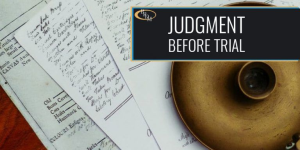SUMMARY JUDGEMENT IN CONTRACTAL DISPUTES
A contractual dispute is a disagreement between parties to a contract about the performance, terms, or implementation of that contract. While some people assume that a contractual dispute must involve a breach of contract, this isn’t necessarily true. A breach can result in a contractual dispute, but so can other disagreements, like how a contract should be interpreted, or if one party wishes to amend a contract and the other refuses.A contractual dispute will occur when parties are unable to reach a mutual agreement about the terms of a contract and how they’re performed. A summary judgement in this instance is a tool that can be used to expediate a case by emiting the need for full trial.This essay will focus on summary judgement in contractual disputes .
SUMMARY JUDGEMENT OVERVIEW

“Cutting through legal complexity: Summary Judgment in contractual disputes, a swift path to clarity.”
Summary judgement is where a party to a dispute may ask the court to rule in their favor without going to trial by using the procedure known as summary judgment. In order to successfully secure a summary judgment, the moving party must show that the law supports their position and there are no real questions of substantial fact. Summary judgment gives the applicant an opportunity for its case to be determined in its favor at an early stage and at a short hearing. The summary judgment process is generally much quicker than going to trial, so this will save time and costs. There may also be a tactical advantage to an application for summary judgment as, even if the applicant is not successful, the other party will have been forced to set out its position and evidence at an early stage.
CONTRACTUAL DISPUTES
Navigating contractual disputes with precision: The power of summary judgment in resolving legal conflicts.
When you are seeking relief because of a contractual dispute,, there are several ways to achieve success. Some cases require a full trial, with many days of arguments, witness examination and cross-examination, experts and presentation of other evidence, followed by a judgment by the jury (or the judge if it’s a bench trial.) In other cases, you may be able to achieve success by filing a motion for summary judgment and winning that motion, which sidesteps the need for a trial on the issue of liability. To win a motion for summary judgment in a breach of contract case under the law, you need several things. You need proof of the existence of a legally valid contract, evidence that there is an exising contractual dispute and proof that that dispute harmed your business. A failure on any one of these three areas can be fatal to your case.
The procedure of the application of summary judgement in contractual dispute cases is as discussed below;
- EVALUATE THE CASE
Before taking any step in a case, evaluating a case is an important step in being able to come up with a solution to a legal problem. Even if the solution seems clear without conducting research, an analysis can help you identify problems you may not be aware of and propose solutions that’ll help settle the employment dispute. In the instance of summary judgment, the evaluation of a case includes accessing whether there are no genuine disputes of material facts.
- FILE A MOTION OF SUMMARY JUDGEMENT
After evaluation of the case, if you believe that the case meets the criteria for summary judgment, your draft and file a formal motion for summary judgment with the court. This motion will include: A concise statement of the undisputed facts that support your position and a legal argument explaining why, based on those facts, the law clearly favors your position.
Supporting evidence, such as affidavits, documents, or deposition testimony, to support your claims.
- SERVE THE MOTION
The party who files the Motion for Summary Judgment is called the “moving party” and can file the Motion if he or she believes that there is no genuine dispute as to any material fact and that he or she is entitled to judgment as a matter of law with respect to some or all of the parties claims or defenses
- OPPOSING PARTY’S RESPONSE
The opposing party has the right to file their defense within the required timeline. The point of the defense should be to argue that there are genuine disputes in the facts and the case should go to trial.
- COURTS DECISION
If the Court grants the Motion for Summary Judgment, the moving party will obtain a final judgment on all or some of the parties’ claims or defenses. If the Court denies the Motion for Summary Judgment, the case will proceed to trial, unless the parties agree to settle the case. Therefore, when the Court denies a Motion for Summary Judgment, the judge is not saying the moving party has lost on the claims or defenses raised in the motion. Rather, the judge is saying that a trial is necessary to determine the outcome of the case.
CONCLUSION
Summary judgment is an invaluable tool for expediting the resolution of contractual disputes. It offers an efficient means of resolving issues when no genuine issues of material fact are in dispute. The success of summary judgments depends on the strength of legal arguments, the quality of evidence, and the application of legal precedents. Striking a balance between efficiency and fairness is crucial, as summary judgments help parties reach a resolution swiftly while upholding the principles of justice and due process in contractual disputes.
